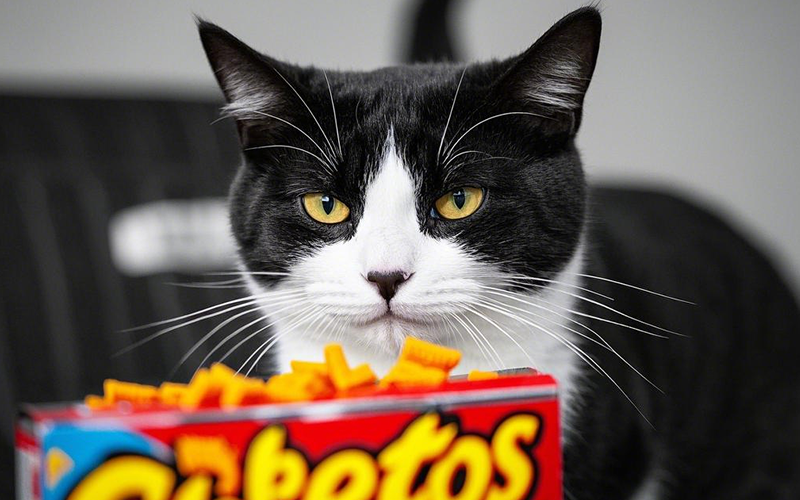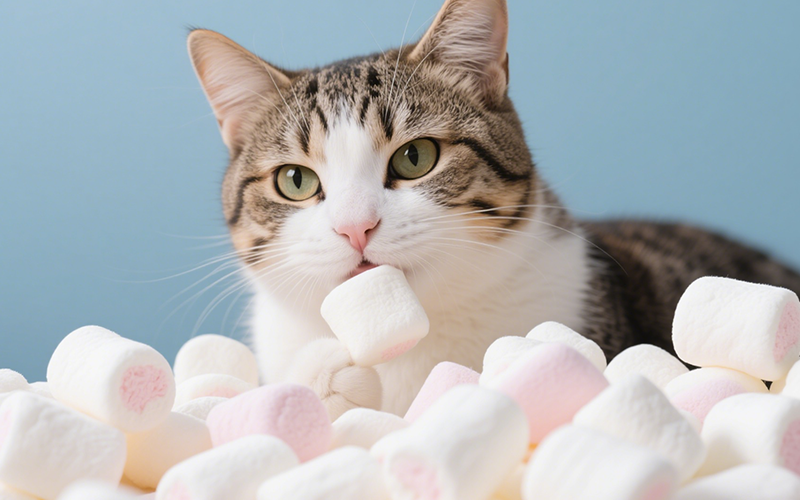Can Cats Eat Cheetos? Exploring the Risks of Feeding Your Feline Snack Foods
- 12 Mar 2025 13:45
As a cat owner, you might be tempted to share your favorite snacks with your furry friend, and Cheetos might just be one of those tempting treats. But before offering your cat this cheesy, crunchy snack, it’s essential to understand the potential health risks and benefits.
Can cats eat Cheetos? While cats technically can eat small amounts of Cheetos, it is not recommended due to the unhealthy ingredients and the potential risks associated with these snacks. Let’s explore why Cheetos should be avoided in your cat’s diet and what alternatives are safer for your feline friend.

Why Cheetos Are Not a Good Choice for Cats 🚫
Cheetos, and similar snack foods, are designed for human consumption and are not suitable for the dietary needs of cats. Cats are obligate carnivores, meaning they require animal-based protein to thrive, and their digestive systems are not built to process high amounts of carbohydrates, fats, or additives found in processed foods like Cheetos.
Here are some key reasons why Cheetos should be avoided:
1. High in Salt 🧂
Cheetos are packed with salt, which can be harmful to cats. Excessive sodium intake can lead to dehydration, kidney problems, and even salt poisoning in extreme cases. Cats are not accustomed to processing large amounts of salt, so a few Cheetos might cause more harm than you realize.
2. Artificial Flavoring and Additives ⚠️
Cheetos contain artificial flavorings, preservatives, and colorings that are not beneficial for cats. Ingredients like monosodium glutamate (MSG) and artificial cheese powder are processed in ways that cats' bodies aren't equipped to handle, which could potentially lead to digestive upset or allergic reactions.
3. High in Unhealthy Fats 🍟
Cheetos are fried and high in unhealthy fats, which can contribute to obesity and other health issues like pancreatitis in cats. Cats don’t need the level of fat found in snack foods like Cheetos, and a high-fat diet can lead to weight gain, digestive issues, and even liver disease in the long run.
4. Choking Hazard 🔴
The crunchy texture of Cheetos may pose a choking hazard, especially if your cat tries to gulp them down quickly. Cats are not used to eating snacks like Cheetos, and the texture might not be suitable for their chewing habits.
5. No Nutritional Value 🥴
Cheetos are mostly empty calories. They provide little to no nutritional value to your cat, as they are mostly made up of processed carbohydrates, salt, and fat. Cats need a balanced diet that is rich in animal protein, essential amino acids, and other nutrients that Cheetos simply cannot provide.
Potential Risks of Feeding Cats Cheetos 🚨
Feeding your cat Cheetos could lead to several potential health risks, including:
Digestive Problems: Your cat may experience vomiting, diarrhea, or stomach discomfort due to the high salt content, fat, or additives in Cheetos.
Obesity: Regular consumption of high-calorie, high-fat foods like Cheetos could lead to weight gain, which can put your cat at risk for obesity-related diseases like diabetes, arthritis, and heart disease.
Kidney Problems: A high salt intake can stress your cat’s kidneys, which are already vulnerable to issues, especially in older cats or those with pre-existing kidney conditions.
Toxic Reactions: In rare cases, some of the artificial ingredients in Cheetos, such as onion powder or garlic powder (which may be found in certain varieties), can be toxic to cats and lead to serious health problems like anemia or organ damage.
What to Do If Your Cat Eats Cheetos 😿
If your cat accidentally eats a small amount of Cheetos, there’s usually no need to panic. However, keep an eye on them for any signs of digestive distress or discomfort. If your cat shows symptoms like vomiting, diarrhea, or lethargy after consuming Cheetos, it's best to contact your veterinarian for advice.
If your cat has eaten a significant amount of Cheetos or regularly consumes them, it’s important to monitor their overall health and consider taking them to the vet for a check-up, especially if you notice any unusual behavior.
Safe Alternatives to Cheetos for Cats 🐱
Instead of feeding your cat junk food like Cheetos, here are some healthier, safe alternatives that provide essential nutrients for your feline friend:
1. Cooked Chicken or Turkey 🍗
Plain, cooked chicken or turkey is a great source of lean protein for your cat. Avoid seasoning with any salt, garlic, or onion, which can be toxic to cats. Chicken is a natural and safe treat that provides essential amino acids, especially taurine, which cats need for heart and eye health.
2. Cat-Specific Treats 🍖
There are many commercially available treats designed specifically for cats, made with ingredients that support their nutritional needs. Look for treats that are high in protein and low in fats, and make sure they are free from artificial additives.
3. Fish (in moderation) 🐟
Fish like salmon or tuna (in moderation) can be a tasty treat for cats. Just make sure to cook the fish and avoid serving it with bones or excessive oils. Fish is rich in omega-3 fatty acids, which promote a healthy coat and support cognitive function in cats.
4. Catnip or Cat Grass 🌿
Catnip and cat grass are both safe and enjoyable treats for cats. These natural plants offer a fun experience for your cat and provide some digestive benefits. They also encourage healthy chewing behaviors.
5. Small Pieces of Cheese (occasionally) 🧀
Some cats enjoy a small amount of cheese as an occasional treat. While cheese should only be served in moderation (due to its lactose content), it can be a fun snack for your cat. Always check for any signs of lactose intolerance before offering dairy products.
How to Safely Treat Your Cat 🐾
When giving treats to your cat, always follow these guidelines to ensure they remain safe and healthy:
Moderation is Key: Treats should never make up more than 10% of your cat's daily calorie intake. Overfeeding treats, especially those high in fat or salt, can lead to health issues like obesity or digestive problems.
Healthy and Balanced Diet: Ensure your cat’s regular diet consists of high-quality, nutritionally complete cat food that provides all the essential vitamins, minerals, and protein they need.
Monitor for Reactions: If you introduce a new treat or food to your cat, monitor them for any signs of allergies or digestive issues, such as vomiting or diarrhea.
PettureX: Your Pet Health Assistant 🐾
If you're unsure whether a particular food is safe for your cat, or if you want to know more about your cat's nutritional needs, PettureX can provide valuable insights and advice. PettureX is an AI-powered pet health assistant available 24/7 to answer your pet care questions, helping you make informed decisions about your cat’s diet and overall health.
Conclusion
In answer to the question, can cats eat Cheetos? While a small amount of Cheetos likely won’t cause harm in a healthy cat, it’s best to avoid giving them this type of snack. Cheetos are high in salt, fat, and artificial ingredients that can lead to digestive upset, weight gain, or other health problems in cats. Instead, opt for healthier, more nutritionally appropriate treats like cooked meat or cat-specific snacks.
If you ever have doubts about what foods are safe for your cat, feel free to consult PettureX for expert advice and tips on keeping your feline friend happy and healthy. 🐱💙
Related

Marshmallows and Cats: A Puffy Problem? Why Vets Say No to This Sugary Snack
- 22 Apr 2025
Kefir for Kitties? A Veterinarian-Reviewed Guide to Safety, Benefits & Risks
- 22 Apr 2025
The Burning Question: Can Cats Eat Jalapenos? A Comprehensive Safety Guide
- 21 Apr 2025
Cool Temptation: Can Cats Eat Ice Cream Safely? The Vet-Backed Truth
- 21 Apr 2025
Frankly Dangerous: Can Cats Eat Hot Dogs? Vet Explains the Serious Risks
- 16 Apr 2025
A Purrfect Protein? Can Cats Eat Ground Turkey Safely? (Vet-Reviewed Guide)
- 16 Apr 2025
Gritty Situation: Can Cats Eat Grits Safely? Vet Explains the Risks
- 16 Apr 2025
Crunchy Query: Can Cats Eat Green Peppers? A Vet-Reviewed Safety Analysis
- 16 Apr 2025
Gravy Danger Zone: Can Cats Eat Gravy Safely? (Vet-Reviewed Warning)
- 16 Apr 2025
Toxic Temptation: Can Cats Eat Grapefruit? Vet Explains the Dangers
- 16 Apr 2025
